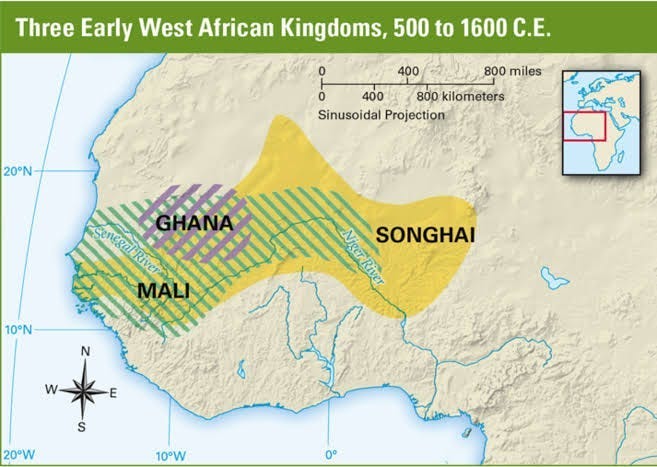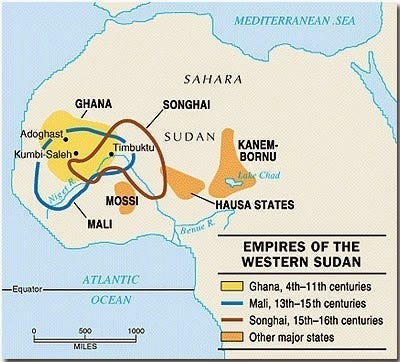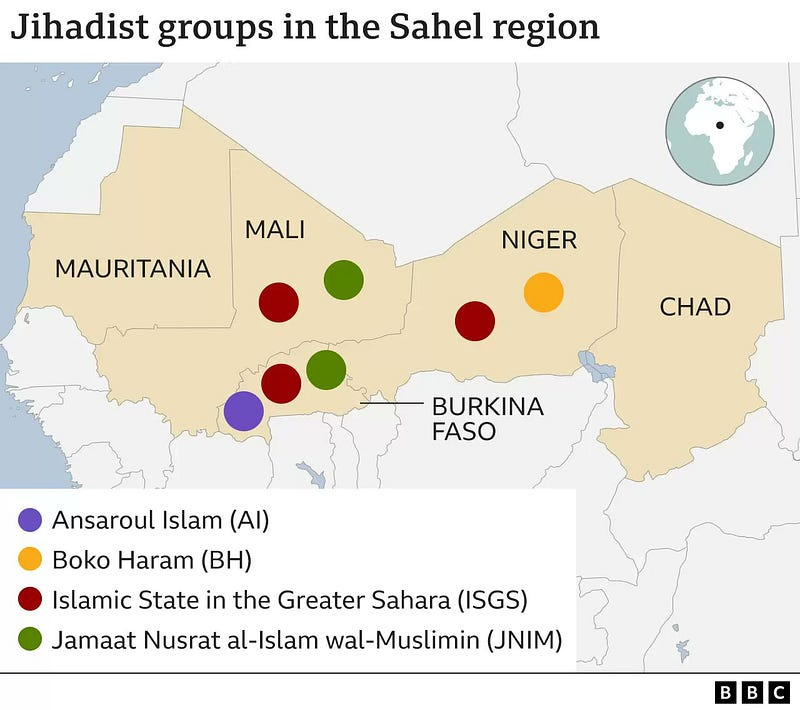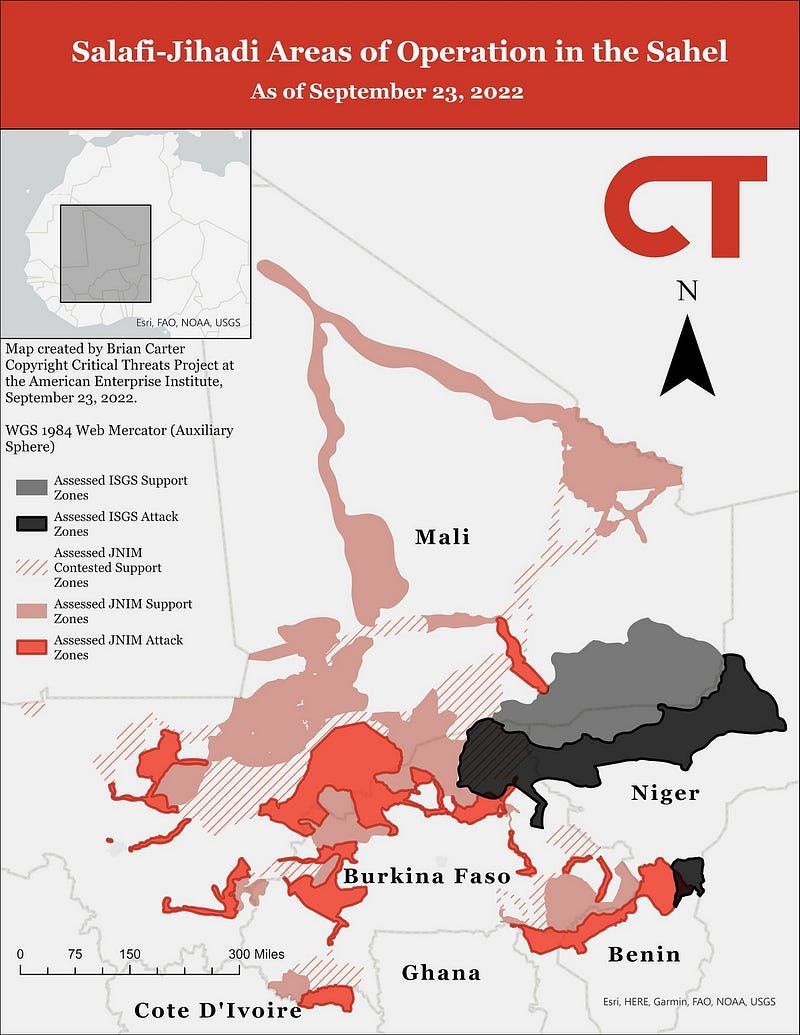A Return of History — The Sahel And West Africa
History is replete with repetition of events. If you study history, little will surprise you in the events of human history, the rise and…
History is replete with repetition of events. If you study history, little will surprise you in the events of human history, the rise and fall of empires, and the repetitive patterns of a polity.
Mali, Burkina Faso and Guinea recently declared their desire to form a shared federation to which ECOWAS is vehemently opposed.
Coincidentally, the area covered by this proposed federation, along with its borders, shows a striking similarity with the something that once was. The map of this federation appears to be a reconstruction of combined territories of the old Mali, Songhai and Ghana Empires, a bastion of Islamic civilization.
With a population of 60 million souls and a landmass of 1,760,256 Km2, the Federation would have 3 Regional Capitals which are the previous capitals of each country that would make up the federation i.e. Ouagadougou (Burkina-Faso), Bamako (Mali) and Conakry (Guinea). If realised, the landlocked Mali and Burkina Faso will have access to the sea via Guinea, which will lead to a promotion of trades, security and transportation networks.
This proposal is the first genuine challenge which may lead to the destruction of the 1884/5 Berlin conference, a means to propel the decolonization process toward completion and a reawakening of history which was frozen for centuries.
The Lost Civilisations
In the 12th century CE, the Ghana Empire crumbled due to drought, civil wars, the opening up of trade routes elsewhere, the rise of the Sosso Kingdom (c.1180–1235 CE), and then the Mali Empire cemented its fate.
The Mali Empire collapsed in the 1460s also as a result of civil wars, the opening up of trade routes elsewhere, and the rise of the neighbouring Songhai Empire.
Songhai Empire collapsed following the 1591 Moroccan Invasion.
The Massina empire (also spelled Maasina or Macina) was an early nineteenth-century Fulbe (Fulani) Jihad state centered in the Inner Niger Delta area of what is now the Mopti and Ségou Regions of Mali. Its capital was in Hamdullahi.
Coincidentally, one of the Jihadi groups in Mali is named after the historic Macina Empire called Katibat Macina. This group, led by Amadou Kouffa and a founding member of JNIM, is one of the most active jihadist armed groups in Mali today.
Originally referred to in press reports at the Front du Libération du Macina, Katibat Macina began operating more publicly after 2015.
The Fulas of the region had for centuries been the vassals of larger states, including the Mali Empire (13th-14th centuries), the Songhai Empire (15th century), the Moroccan pashas of Tomboctou (16th century), and the Bambara Empire at Ségou (17th century).
A Reluctance for Change
Redrawing Africa’s borders to reflect its indigenous ethnic realities could be one way to address the challenges facing the continent and pave the way for a more stable and prosperous future.
Despite our struggles, we are still stuck in the 19th century and our souls continue to revolt in rejection of the realities carved by aliens with neither context nor consent.
Beyond the Berlin Border — Restoring Africa’s Nations and Civilisations
Despite our struggles, we are still stuck in the 19th century and our souls continue to revolt in rejection of the…blog.thinkyorubafirst.org
Separatist Movement In Mali
According to a Reuters report, in Northern Mali there exists a movement for sovereignty & independence for the Tuareg people. The Tuaregs claim to be marginalized, so they formed “Azawad”, different from other Islamic Jihadi groups. Previously, a coalition of armed groups in northern Mali pulled out of long-running peace talks based on a 2015 Algiers accord because of what they call a lack of political will by Mali’s military government. The agreement sought to decentralise Mali, integrate former rebels into the armed forces and bolster the economy of the north. Progress has been slow. Decentralisation has not happened, and constant violence has stymied attempts at disarmament and ravaged the local economy.
A historic reoccurrence
Different Jihadi groups across the Sahel are a repetition of historic events that have shaped the region before colonization. At different periods in history, many jihads inspired wars were fought to actualise the creation of Islamic states across the region. The world today continues to be informed by history, which shapes the present and even predictions of the future.
Implications of Security Threats in West Africa and the Sahel
Islamic Jihadi threats are already our realities and bear consequences for different ethnic communities that constitute West Africa and the Sahel.
The jihadist rebels appear to be creating a large area of influence from Niger to Togo in order to keep supply lines open, recruit people and procure material, say analysts.
Last year, Togo experienced its 4th terror attacks since 2021, causing deaths and displacement. As we know, this is one of the West Africa coastal countries.
As the most affected Coastal West Africa State, the Benin Republic is afflicted with the expansion of JNIM, an Islamic Jihadi Organisation, which has been recruiting personnel from Bariba ethnic communities across the Northern region of the country.
Beninese government is preparing to invite Rwandan Military for assistance. The violence in Benin, a country of 12 million people, is largely a result of what’s happening in neighboring Burkina Faso, where jihadi attacks have killed hundreds and displaced nearly 2 million people.
Initially, the attacks were confined to the border between eastern Burkina Faso and Benin in the Alibori and Atacora regions, but are now expanding. A rise in incidents in populated areas around the parks with jihadis connected to the al-Qaida-linked group known as JNIM, has pushed Benin’s military from the border creating a security vacuum which has allowed the terrorists to take control of part of the country.
Jihadi attacks in Benin have spiked more than tenfold between July and December compared to the same period in 2021 — from 2 to 25 — according to the Armed Conflict Location & Event Data Project. This is more than any other coastal state in West Africa.
Meanwhile, communities in Benin say they are being forced to accept a life they never thought they’d have to endure.
“We thought for a moment, perhaps because of a certain naivety … that (we) could escape the situation of threats, of near-daily attacks that (Benin) is undergoing,” said Arnaud Houenou an expert in national security and a professor at Benin’s University of Abomey Calavi.
“Benin has been spared the terrorist war in the Sahel despite its proximity to Nigeria and Burkina Faso,” he said. “But reality has set in.”
NIGERIA
Nigeria experienced Increased ISIS spread, with the recent Owo church attack in 2022. As the first of its kind in the South-West (Yorùbá) region, it signals a very dangerous precedence, Kogi a North Central state, with a part of its populace Yorùbá of it called okun-region and others, had experienced ISWAP claimed attacks in the western section of the state occupied by the Yorùbá.
Likewise, Taraba, Niger and Abuja, the Federal Capital city, have been riddled with incessant attacks by various armed groups.
It is important to note that Kogi is the most strategic location in Nigeria, closest to Abuja, the power center of Nigeria, from which attacks could be launched on at least 10 states. If the extremist violence continues to spread, it could have far-reaching consequences. It’s a direct threat to Lagos state from the Western flank.
In Benin Republic, Yorùbá People are likely the third largest ethnicity. As the occupant of the coastal region with the threats from Sahel towards the South, there is no escape, either push northwards or we are pushed to the sea.
We may have to find remedies from revisiting our past.
Meanwhile, the need for political leaders to preempt and respond to the current development is crucial. The crisis is existential, therefore, if the capacity to ensure the peace, security and livelihood of the people is not secured, the doctrine of necessity and self defence may end up ruling the day. Therefore, measure like Amotekun need to be expanded for further effectiveness.
Be sure to share, like & comment, and subscribe across all platforms.
Àṣírí Ọ̀rọ̀ | Substack
Africa is neither a monolith nor a country. We analyse issues including (geo) politics, social and economics, focusing…imo.asirioro.com









